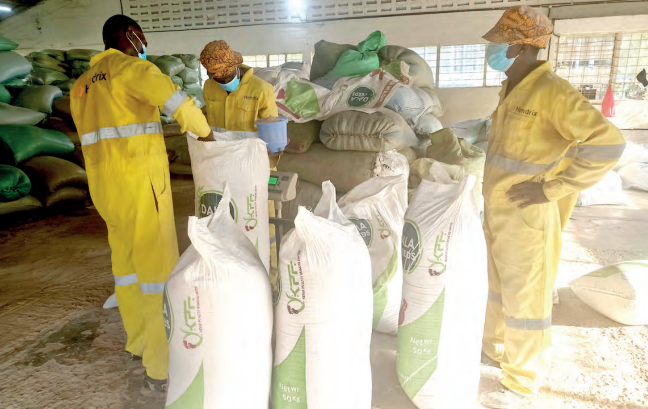
In the heart of Kisumu County, one man’s journey from humble poultry farming to a thriving agribusiness is changing the lives of many.
What started as a small backyard poultry venture to pay college fees has evolved into a fully-fledged agribusiness, providing affordable, high-quality feeds and technical expertise to poultry farmers in Kisumu.
Dala Feeds, a product of the Kenya Poultry Farmers (KFP), evolved from a small backyard operation into a leading producer of poultry feed.
KFP director Hezron Opiyo said Dala Feeds began with the establishment of KFP, which was registered in 2015.
“We’ve been operational since then, but the roots of the business goes way back,” he explains.
Opiyo’s journey in the poultry business started after he completed secondary school in 2010. This was after facing financial constraints that hampered him from furthering his education.
“I had to stay home for about two years. I asked my cousin who was keeping chickens if I could help on the farm and he agreed. I worked for him for a year with no pay, but I received bonuses based on sales. I saved some money,” Opiyo says.
After his cousin closed the poultry business, Opiyo asked for the chicken feeders and drinkers to start his own farm.
He started with 50 chickens behind his mother’s house. His aim was to raise enough money for his college education.
His flock quickly grew to 100 chickens. He sold some and registered for a diploma in business management at the Kenyan Institute of Management. He graduated in 2012.
“The business continued to expand as I received more orders from hotels and restaurants,” he says. He collaborated with friends and local farmers to meet the demand.
Opiyo then enrolled for a degree programme in project planning and management at the University of Nairobi.
After graduating, he faced a tough decision of whether to seek employment or continue expanding his poultry business.
He chose the latter and registered Kenya Poultry Farmers Limited.
KPF supports small, medium and large-scale farmers in Western Kenya by supplying farm inputs, feed and chicks. It also offers technical training and market access.
Opiyo says local farmers face many challenges including fluctuating egg prices and competition from cheaper imports, especially from Uganda.
Despite rising feed costs, many farmers struggle with poor egg prices, making it difficult for them to break even. KPF makes feed prices more competitive to ensure poultry business is profitable.
“We buy broilers at Sh450 each, and for kienyeji chickens, we pay between Sh750 and Sh850, depending on weight,” Opiyo explains.
Dala Feeds is derived from the Luo word for home. “Dala Feeds was born out of the need to reach more farmers and provide them with affordable, locally produced feed,” Opiyo says.
Two years ago, KPF acquired feed production machines through a five-year lease agreement in partnership with German Agency for International Cooperation (GIZ) and Afriscope, which helped with import duties, machine setup and warehouse leasing.
“This partnership has been crucial, especially since we’re working in collaboration with the government,” Opiyo says.
By sourcing raw materials like maize and soya locally, Dala Feeds produces poultry feed at lower costs, making it 20-30 per cent cheaper than competitors.
“Our goal is to make feed affordable and ensure farmers can get the most out of their operations,” Opiyo says.
Moving forward, KPF plans to contract farmers to grow soya and sunflower locally, ensuring feed ingredients are readily available and prices remain affordable.
Beverly Shitandi, a private sector partnerships adviser for the GIZ AgriJobs project, says they have been promoting youth employment in the agri-food sector, across various industries and value chains they support.
“We are focused on promoting youth employment and we consider the private sector a key player in supporting this goal,” she says.
“When you look at the employment landscape here in Kenya, across Africa and the world over, 80 per cent of employment opportunities come from the private sector. We view the private sector as an essential partner for our project, which is why we are committed to supporting the development of MSMEs at various stages of growth.”
Shitandi says they provide support to young startups and early-stage SMEs through a mentorship programme, in collaboration with various organisations.
“We run a mentorship programme where business coaches guide these enterprises. We also have peer mentors [other businesses that mentor each other]. Additionally, we support growth-stage enterprises,” she says.
She further elaborates on the SME loop, a GIZ-supported initiative aimed at helping growth-stage enterprises.
“Through the SME loop, we support these businesses with mentorship from experienced business coaches,” she says.
“Currently, we are mentoring 75 enterprises, having started with 50. For growth-stage enterprises through the SME loop, we have supported 50 and aim to assist 150 more in the near future.”
Shitandi says advanced-stage enterprises, such as Kenya Poultry Farmers and Dala Feeds play a pivotal role in supporting out-grower skills.
“We see these enterprises as key
drivers of employment, both at the
enterprise level and in production-led sectors,” she adds.









